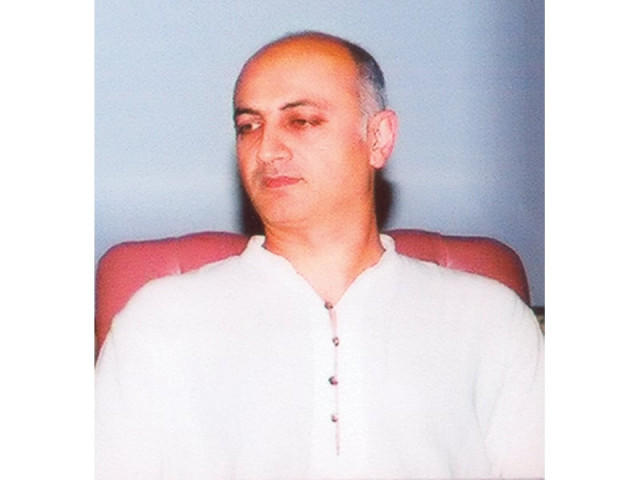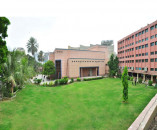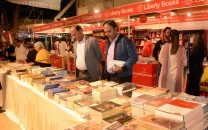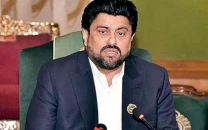Art wars : In a contemporary world, is tradition no longer a credible inspiration, ask academics
Speakers compare the Pakistani context of ‘tradition’ and its impact on understanding art.

The only audible sounds in the room were the speakers’ amplified voices and the soft purrs of an errant cat that sat among the audience, washing its face in happy oblivion as the complex discussion meandered through the labyrinth of art history. A panel of artists, scholars, teachers and gallerists gathered in the dimly lit lecture hall of the Indus Valley School of Art and Architecture to root up the age-old discussion on ‘Tradition and Art’ and decide whether the connection between the two still exists.
Split into two sessions, speakers Dr Ejaz Akram, Dr Wahab Suri, Dr Basit Koshul, Taimoor Khan Mumtaz, Naiza Khan, Salwat Ali and Sumbul Khan took turns to speak. Fatima Quraishi moderated the first talk on tradition, ‘Continuity and rupture’, and different perspectives on tradition within the local and South Asian context. Taimur Suri oversaw the second session on ‘Tradition and the Arts’. The whole event was the brainchild of Bayatunur’s Taimoor Mumtaaz and Poppy Seed Gallery’s Sumbul Khan. They collaborated with the IVS and Iqbal Academy Pakistan to put together a seminar from 10:30 am to 4 pm on Saturday.
The speakers gnawed away at the meaty topics and the talk flowed freely. They rambled on basic ellipses, angles and proportion, the difference between art and craftsmanship, trying to draw — or blur — the line between tradition and the role it plays in the perception of art. Eventually, its very existence in modern art came under fire. Scientific reasoning that can conclusively confirm arguments is given preference over the ambiguous and forgotten concepts of culture and tradition. Most of the presenters greatly appreciated that they could speak unhampered and without the fear rubbing anyone the wrong way.
Mumtaaz explained art from its Islamic origins, using symmetrical domes and pillars to exhibit traditional art’s “functionality and beauty”. Naiza Khan took a more personal stance, tracing through her own journey as she “tried to find a certain kind of language to work through” back in 2002 when she painted on walls with her bare hands. She was of the conviction that “traditions are gone but we don’t know it”.
After Salwat Ali presented her notes on how art acquires its fame, by comparing miniature art and calligraphy, Sumbul Khan wrapped up the second session with the ‘Local Global Conundrum’. She focused on art spaces and collectors and their role in the battle between the local and global stages. She traced the metamorphosis of global art from being either a “spectre” that overshadows local art or a “liberating” saviour to it travelling closer to home until the local scene becomes the centre. Now, she feels global art has an eastern message, and is at a new frontier altogether.
Dr Abdul Wahab Suri explained that though he would have liked to have had more students attend, he understood that most would be left floundering with such complicated concepts. “Tradition is interpreted as religion and that becomes overwhelming.”
Dr Suri felt that people came away with the concept that society is completely traditional, an “ideal concept rather than actual”. In truth, “tradition is eroding away”— it is fading from our minds like history.
The audience, which had dwindled to a few dozen by the end, filed out of the room in an almost reverent hush. “They provoked feelings that we had forgotten, and didn’t even know it!” exclaimed a girl at the entrance. Concepts that were particular favourites were those of globalisation as a process based on a society’s individuals and how one of the speakers connected tradition with people being “thrown on the planet to discover it for themselves”.
The bashful Dr Basit Koshul, who spoke about tradition in a globalised world, managed to skirt questions on the outcome of the seminar but Dr Ejaz Akram was jubilant about the whole affair. Though he felt not everyone was swayed to his views, it did not dampen his mood, “not even the Holy Prophet (pbuh) convinced everyone,” he grinned.
In the end, as Dr Akram aptly put it, “at 62 people, the turnout was satisfactory, there were no hindrances, no major fights and that means we had a successful seminar.”
Published in The Express Tribune, May 3rd, 2011.



















COMMENTS
Comments are moderated and generally will be posted if they are on-topic and not abusive.
For more information, please see our Comments FAQ